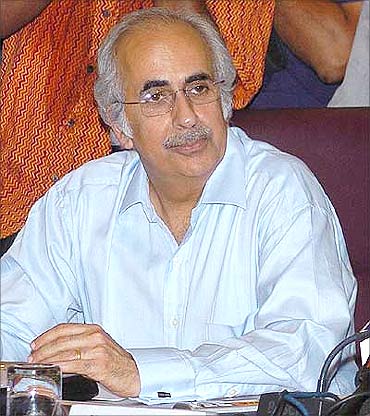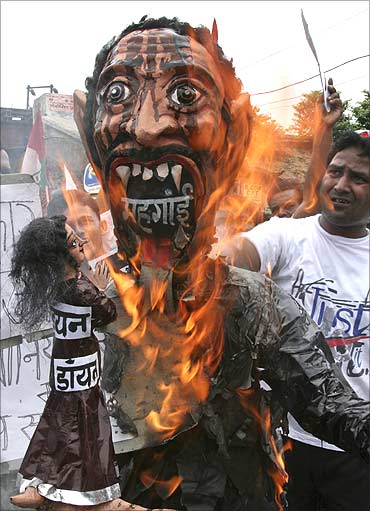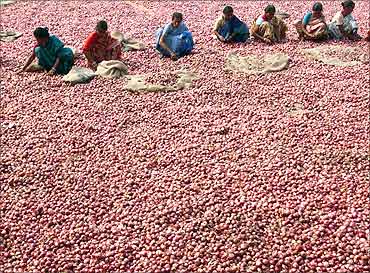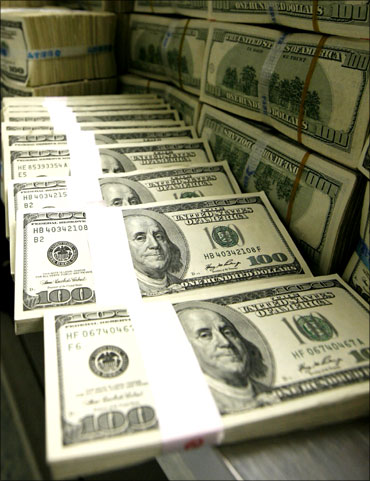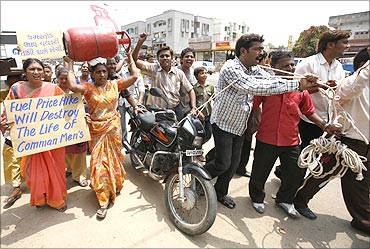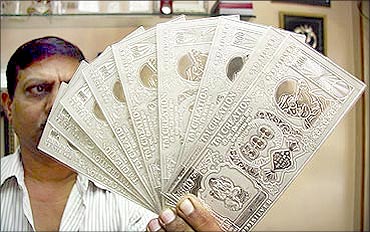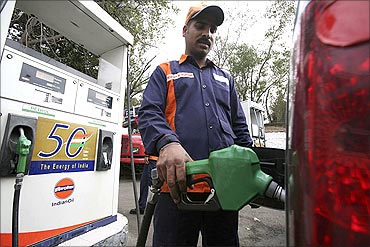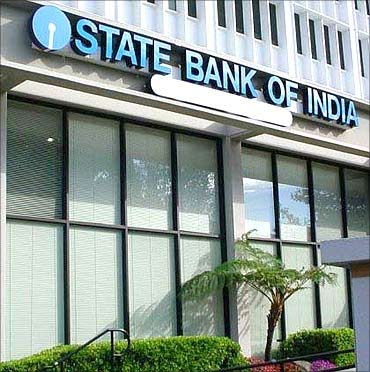This article was first published 14 years ago
What to expect from the Budget
Last updated on: January 5, 2011 13:05 IST
Image: Finance Secretary Ashok Chawla.
Photographs: Press Information Bureau.
The Budget mood has not yet gripped North Block, headquarters of the finance ministry. There are no special security guards stationed outside the rooms of key secretaries, though preparatory work for Budget 2011 has already begun.
Rising inflation and a wider current account deficit may have dampened the finance ministry's outlook on the state of the Indian economy, but Finance Secretary Ashok Chawla exuded optimism that the government's fiscal deficit reduction programme was on course.
In an interview with Vrishti Beniwal and A K Bhattacharya, Chawla also outlined the key thrust areas of Budget 2011. Edited excerpts:
Image: People protest against inflation.
Photographs: Reuters.
As we have entered into the last quarter of the current financial year, what are your key concerns as the finance secretary? On the positive side, we are more than reasonably satisfied that we have seen good growth. We rebounded back to the kind of growth the economy was seeing before the financial meltdown late 2008 onwards.
The two concerns we have at this point in time are inflation and the current account deficit. Inflation continues to be more than what we wish it to be. The current account deficit is more than what we have lived with in the past.
Image: Labourers sort onions at a wholesale vegetable market in Siliguri.
Photographs: Reuters.
On inflation, the government seems to be caught in a bind because globally prices have gone up. In this scenario, what scope does the government have in tackling inflation? In a way, you are right because normally for controlling inflation either you use the supply side or you use monetary policy to control overheating. Both are really not useful or effective in the kind of circumstances that we are in.
Partly, this inflation has to do with the fact that growth has been quite high. There is a fair amount of purchasing power with people. So, they are looking for more food and more protein. That is reflecting in the increase in price of these commodities.
Structurally, the agriculture sector cannot respond to that. Food inflation is the key component of inflation. Second, commodity prices are again inching up all over the world. That will continue to put pressure so far as the inflation is concerned. In the short or medium term, the expectation is that inflation is going to be there.
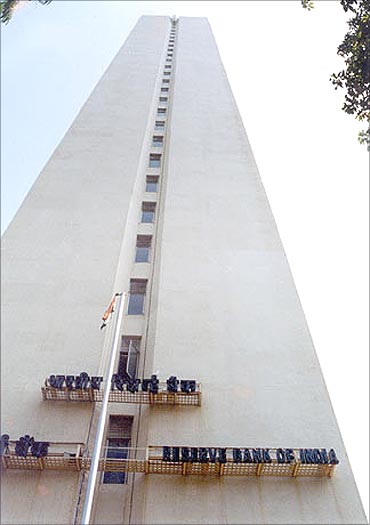
Image: Reserve Bank of India.
What is likely to be its range? It has to be a dynamic range. By March 2011, it should be between 6 and 6.5 per cent. It will be difficult to put a precise number. The November headline inflation was 7.48 per cent. It may go down, but not much.
Do we have to live with such high rates of inflation?
As I mentioned, it is basically driven by food inflation. Apart from administrative and other steps, which have been taken, it is not possible to suddenly increase the supply-side response.
The other is that both the government and the Reserve Bank of India have to strike an optimal balance between achieving growth and controlling inflation.
You can use very aggressive monetary policy but then you strive for growth and employment. In that sense, the policy space to tackle this kind of inflation is certainly somewhat limited.
On the current account deficit, foreign direct investment seems to be an added concern.
Image: FDI falls.
Is there a policy response to this issue because right now the surplus on the external account has shrunk considerably? The current account deficit is certainly higher than we have had in the past. It is going to be close to 3-3.5 per cent by March 2011 and that is because exports have not done well. This is how we are financing the current account deficit.
We have seen fairly robust foreign institutional investments. We are still not out of line with the kind of money we can absorb. That is something we have been watching. The other is FDI and it is true that FDI in the first 7-8 months of this year has been lower than the last year.
But FDI is not something like a tap which turns on and turns off like foreign institutional investment. FDI is linked to specific projects and specific capital investment. Something may not come for three months and suddenly you get so many proposals.
So, we are watching the FDI part but I don't think it is a report card on our FDI policy or there are apprehensions about the Indian economy. Contrary to that, everyone is complimenting us for the kind of growth India is seeing.
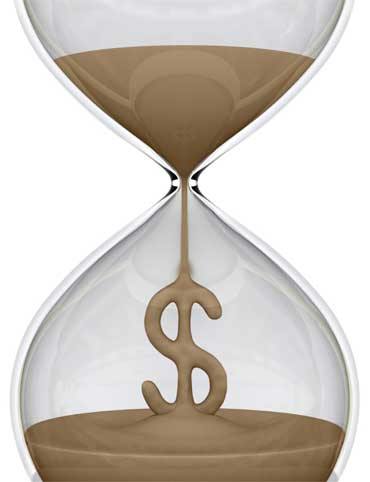
Image: FII flows are really a matter of concern.
Has the project clearance mechanism slowed because of environment clearance hurdles? Barring a few projects, which one can count on fingertips, I do not think that is really the cause. The other issue is whether FII flows are really a matter of concern.
Should we be worried that it's predominantly the FII flows, which are funding the current account deficit? Conceptually, one might say that this is money which has a tendency to come in and go out at a short notice.
But from 1992 onwards, only for the period in 2008, which was not a normal situation, FIIs needed to take money out to settle their books of accounts at their primary locations.
The bottom line is that as long as we are doing well in terms of growth we will get money, which will fund the current account deficit. It will be a combination of FII, FDI, FCB and so on. The proportions might vary and change from time to time.
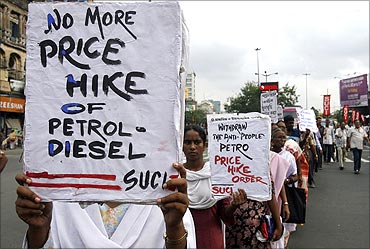
Image: Activists from Socialist Unity Centre of India (SUCI) hold placards during a protest.
Photographs: Parth Sanyal/Reuters.
Are you happy with the way we have handled rising subsidies, because in the oil sector not much progress has been made? Budget 2010 had responded to some of the issues and what it had said is that we would try to move more transparently in the area of subsidies.
I think the system and the political executive realise that there have to be subsidies, but they should be more effective and more targeted. So, that's the direction in which the subsidy regime is moving in terms of fertilisers.
Petrol prices have been deregulated. In principle, the decision was that diesel should also move in that direction, but in a calibrated manner.
With the current rate of inflation, the perception is that this would not be the best time to move aggressively in these areas, which might further add to inflation. So, this has been postponed.
Image: A woman carries a cooking gas cylinder as men pull a string tied to a motorbike during a protest.
Photographs: Amit Dave/Reuters.
On fuel subsidies, are you willing to share more than one-third of the burden of retailers? Is lowering of import duties also an option before the government? On what percentage the government will share at this point in time, the decision is one third. I can't say whether there is any further consideration of this issue, though the petroleum ministry would want that.
On duties, at this point in time there is no proposal. But when the Budget is formulated, the finance minister in the normal course looks at various sectors in relation to duties and taxes.
So, if there is a rationale or justification, I suppose an appropriate decision will be taken.
Image: A jeweller displays silver plates in the form of Indian rupee notes in Chandigarh.
Photographs: Ajay Verma/Reuters.
On the expenditure side, the government now has to deal with pressures coming from new rights and entitlements. Do you think that expenditure management itself is a challenge? The expenditure management philosophy is fairly crisp and well articulated. The government would want to spend on its flagship programmes.
It would like to spend money to give legal entitlements, which has been the philosophy of this government.
But clearly the idea and the message is that the expenditure right down to the lowest level should be effective and actually go for the purpose it is intended, so far as the policy framework is concerned.
That is a part of the monitoring, which takes places through the Planning Commission and the line ministries.
On tax reforms also, the year has been very bleak, as most of your proposals were postponed.
The Direct Taxes Code did not get really postponed. It was not possible to put in place an entirely new architecture over a short period of time and bring into effect from April 2011.
It is in Parliament now and they (Standing Committee) are having a look at it. So, that is on track. But on the Goods and Services Tax, there has to be some kind of consensus first and then legislative changes. It will take some time.

Image: 3G auction, a money spinner.
With the current scenario in place, do you think the government can meet its fiscal deficit target this year?
This year, we are definitely meeting the fiscal deficit target, partly because we got a good amount of non-tax revenue.
This year, you got 3G money. But how do you plan to achieve the target next year? The fiscal deficit this year will come down to 5.5 per cent from 6.7 per cent last year. It could be even lower than 5.5 per cent.
So, there is a significant drop. But for a fiscal deficit target of 4.8 per cent next year, the drop would be only 0.7 per cent.
We realised you cannot have reductions of the magnitude which you had in the beginning. So whether we get windfall gains or not, it is not germane to the fall in fiscal deficit.
Second, we are seeing a good amount of buoyancy in revenue collections, which we are confident would continue in the next year.
Image: A worker at an Indian Oil petrol pump.
Photographs: Mukesh Gupta/Reuters.
So, the oil prices and subsidy going up will not upset your calculations? They should not because there is no projection that oil will go to some unrealistic level. Though $90-100 per barrel is not a comfortable zone, but we will see as we go along.
Disinvestment has not done really well. Do you expect the target would be met?
Disinvestment is also on track. One or two companies are due to come out with their offerings in the next two months. So, they should be in a position to do that.
Oil sector companies are in a bind. If oil prices don't get raised, then their ability to raise money from the market gets undermined. Perhaps this is linked to the oil sector reforms.
This year they are talking of ONGC. IOC is not intended for this year.
Image: State Bank of India.
The current year also saw the creation of the Financial Stability and Development Council (FSDC). FSDC had its first meeting. Can you tell us what principles were ratified? The whole idea after the financial crisis was that we must strengthen our institutions. If you go back to the Budget speech, there are clear policy pronouncements that public sector banks will be recapitalised so that they have more ability to withstand the kind of shocks, the financial sector can give.
All that is in the pipeline. We are providing money. The second part of the architecture was that we must have a kind of mechanism which looks at the holistic picture in terms of what is happening, what is not happening, what needs to be done and also look at futuristic intervention which may be necessary.
We looked at what was happening around the world and came up with this idea of FSDC, which is not intended to be a statutory body. It is a kind of executive forum. We hope this will serve the country well as we go ahead. The other component was a feeling that our financial sector laws need to be looked at.
Some of them are very old and go back to a period which may be of vintage. That is why the FSLRC (Financial Sector Legislative Reforms Commission). We are in the final stages of setting that up. With the team and the terms of reference, we should announce that before the end of this month. We hope to have it chaired by a well-known retired judge.
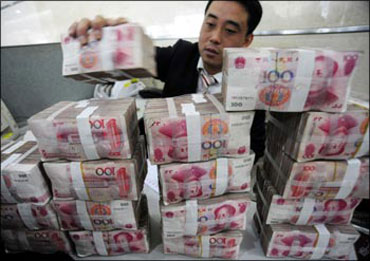
Image: Chinese currency.
On currency issues, was it the first time that there was a clear articulation of the government's concerns about the Chinese currency valuation? Do you intend to take any steps? We just looked at what was going around in the world. So far as we are concerned, the impact is not material. So, we do not need to react to what is going on in other major economies and trading partners.
If one were to expect something in next year's Budget, what would that be?
I really have no idea because very little of the next year's Budget is in position at this stage. Second, even if it were I would not be in a position to talk about it today.
What you have to read is the thrust and the direction the finance minister has given in his last two budgets.
These are how to unshackle and achieve more growth, how to strengthen the real sectors and address their concerns, how to strengthen the financial sector and the regulatory architecture, how to conceive new activities which make India a strong economy and make it earn its rightful place in the global system.
There is focus on agriculture and some aspects of manufacturing. Presumably, we need to build on those policies of the government.
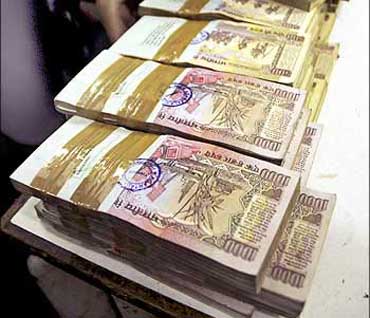
Image: Rise in frauds.
Photographs: Reuters.
This year, we have seen major corruption scandals in the country and the finance ministry is connected with two of them. One is the Citi fraud. What kind of checks and balances are there with regard to foreign banks, which can prevent such fraud that can undermine the confidence of the people in the banking system? The second one is about the leak of tapes of telephonic conversations ordered by CBDT in the 2G case. It is being said that the government is taking action against officials who have leaked the tapes. Would you like to throw some light on that? I have no idea on either the tapes or their leakage. That is more an administrative thing, which concerns the revenue department.
On the other issue about the bank, the regulator is looking at it and the police are doing the investigation. But I do not think there is any systemic issue in that.
Here are issues where people choose to be very enterprising and on the other side there are parties who want to make money. The process is hijacked for some time by somebody or the other. That is a criminal act which will entail the due response to that.
